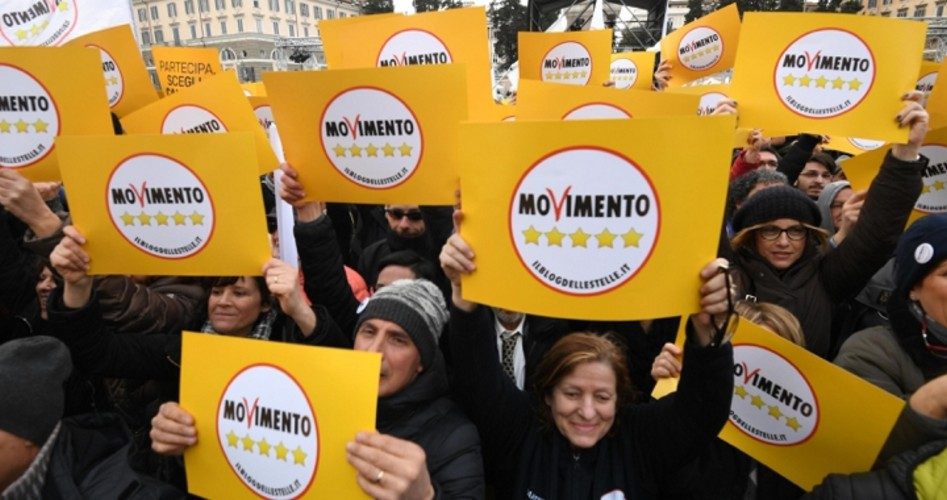
The European Union super-state and the globalist establishment that controls it, along with the open-borders and mass-migration agendas they are pushing, just suffered a massive defeat in Italy’s historic election. The huge victory of so-called “populist,” right-of-center political parties was almost universally viewed as a stunning rebuke of the EU — and especially of its unpopular agenda to flood Europe with Islamic immigrants while de-Christianizing the culture and smashing self-governing nation-states. Some commentators have even compared the outcome to Brexit or Donald Trump’s election to the U.S. presidency. However, with negotiations on forming a government just beginning, the voter outrage against the establishment could still be blunted by behind-the-scenes scheming.
The single largest winner of the weekend’s election, based on preliminary results, was the anti-establishment Five Star Movement (M5S). Despite being constantly attacked and demonized by the establishment press, the political party with anti-EU roots secured a third of the votes — the largest share of any party, and almost twice that of its nearest competitor. Depending on how the final results and political talks go, the M5S party could play the role of king maker in whatever coalition government emerges amid ongoing negotiations between the parties to form a government. It fell short of being able to govern outright on its own, though not by much.
Behind the M5S but also performing extremely well was the Northern League, or Lega Nord in Italian, with roots in secessionism and strong anti-establishment credentials. Today, the party is known simply as the League. Its leader, Matteo Salvini, is sometimes compared to the United Kingdom’s liberty-minded Breixt leader Nigel Farage, or even to Trump. Salvini vowed to take on the European Union super-state to make sure “Italians come first.” Among other popular positions, the party has called for mass deportations of illegal immigrants and for reining in the unaccountable super-state in Brussels.
As so-called euro-skeptic, pro-borders, anti-establishment “populist” parties surged in the election, the far-left, pro-EU governing party, known as the “Democratic Party,” all but collapsed, earning its lowest vote count ever. The political career of its leader, former Prime Minister Matteo Renzi, appears to be over, analysts said. Even together with his broader globalist, far-left coalition partners, the alliance got less than one in five votes. Top members of that coalition, including the Interior Minister and the Culture Minister, even lost their own seats in the Parliament, highlighting the devastating defeat of the ruling establishment.
Meanwhile, the forces of former prime minister Silvio Berlusconi, the eccentric billionaire media baron who has been a staple of Italian politics for decades, finished behind his more anti-establishment rivals on the right. But his party, Forza Italia, could still play a key role in whatever governing coalition emerges from negotiations. Indeed, as of now, political leaders have suggested that Lega’s Salvini and Berlusconi’s surrogates may join forces to form a right-leaning coalition government. Berlusconi himself is not allowed to be prime minister anyway, due to criminal convictions.
Salvini, who has so far resisted calls to openly seek a ruling alliance with the more popular M5S, has indicated that he may join with Berlusconi’s party to govern Italy. “I am someone who keeps my word, and the commitment is for a center-right coalition which won and can govern,” Salvini said, referring to a “gentleman’s agreement” between him and Berlusconi that called for allowing whichever of the two parties won the most votes to name the next prime minister. If that comes about, Salvini would likely become Italy’s next leader.
Other options for potential coalition governments, assuming the early election numbers hold and translate into parliamentary seats, include the possibility of an alliance between M5S and Renzi’s party. However, with even establishment-minded analysts noting that Renzi has been “demolished,” forming an alliance with such a politically toxic party may prove difficult. More than a few prominent voices in Italian politics have proposed a “populist” coalition between M5S and Lega, the two largest parties based on votes. But with M5S reluctant to form coalitions, some analysts and media voices have suggested Italy could become “ungovernable.”
No matter what happens in coalition negotiations among the parties, the implications of the election are huge. For one, the results have been widely and correctly portrayed as a devastating blow to the EU — just two years after British voters defied the establishment and voted to secede from the super-state and less than six months after Austrians also voted for populist-sounding, right-wing leaders who vowed to crack down on mass migration and the EU. Indeed, throughout the campaign, the EU served as a punching bag, with some leading candidates arguing that Brussels was treating Italians like “slaves” in a bid for total control.
So far, none of the EU’s various unelected bosses have commented on the historic election result. That may be to avoid further antagonizing Italians. Top officials in both of the biggest two parties have refused to rule out the possibility of Italy leaving the single “euro” currency — or even the entire EU altogether. Lega’s economic policy chief recently warned that Italy could invoke the withdrawal article, following the lead of the United Kingdom and its “Brexit” vote to secede. He also declared that the EU was a “bankrupt project” that has brought “no good” to its members.
Unsurprisingly, the election results also sparked panic in other EU member states. German Member of the European “Parliament” (MEP) Hans-Olaf Henkel, for example, said it was time for his own nation to ditch the euro — and fast. “The majority of Italian Election results are critical toward the EU, even against the euro!” he warned, adding that Italian politicians “promised the moon” to voters. “The results will mean even higher debts than those 130 percent of state debt today, further deterioration of competitiveness of Italian industry and more unemployment.”
It will also mean that wealthier Norther European neighbors will be forced to continue subsidizing their free-spending Southern counterparts, MEP Henkel told the U.K. Express. “But Italian president of the European Central Bank, Mario Draghi, will print even more money,” he warned, echoing widespread fears in Germany rooted in its own history of hyperinflation and central-bank gimmickry to expand the currency supply. “In the end, the eurozone will be the ideal transfer mechanism from the north to the south. That’s why Germany must get out of the euro now!”
Aside from the growing rage against the EU illustrated in the vote count, the Italian election result was also widely viewed as a furious response by Italians to the mass-migration tsunami that has swamped the Mediterranean nation in recent years. According to estimates, more than half of a million migrants, mostly from Africa and the Middle East, have poured into the nation just in recent years, the overwhelming majority of them classified as “economic migrants.” A number of high-profile incidents, including a gruesome murder perpetrated by Nigerian migrants, have added fuel to the fire.
Indeed, the two common threads among the victors in Italy’s election are suspicion of the increasingly oppressive EU, as well as fierce opposition to mass Islamic immigration and open borders. Despite the results, though, establishment media organs continue to refer to the victors as “far right,” inadvertently revealing the fact that most of the press — not just in Italy, but across the Western world — is on the far left of the political spectrum and way out of touch with everyday people.
Ironically, rather than redefining the center of the political spectrum, the media simply continue to expose themselves as being on the fringe, further alienating whatever remains of their audience and destroying any claims to “objectivity.” This is the same phenomenon that occurred in the United States with the victory of Trump on an anti-globalist platform over the entire globalist establishment and virtually all of its propaganda organs. By crushing Hillary Clinton, Trump’s election showed that it was the press and the establishment that were out of touch — not Americans concerned about sovereignty, mass migration, and globalism.
But with the globalist establishment in Brussels and beyond facing increasingly hostile rejection from the people it hopes to rule, there will no doubt be attempts to hijack and neutralize the growing uprising. Indeed, top globalist organizations such as the Council on Foreign Relations have openly called for such a hijacking. Italians, like Americans and Europeans across the bloc, must remain on guard to ensure that they are not betrayed by the very “anti-establishment” leaders they have elected to take on the establishment. Unfortunately, it happens more often than most anyone would like to admit.
Photo showing Five Star Movement supporters: ANSA via AP
Alex Newman, a foreign correspondent for The New American, is normally based in Europe. He can be reached at [email protected]. Follow him on Twitter @ALEXNEWMAN_JOU or on Facebook.
Related articles:
In Austria, Voters Choose “Right-Wing Populism”
European Anti-Globalists Join Forces to Take Back Countries
Hungarian Leader: Only Christianity Can Save Europe
Anti-EU Parties Soar in “Political Earthquake” Elections
Bilderberg Leader Mario Monti Takes Over Italy in “Coup”
EU Boss: Citizens Should Not Get to Vote on Important Issues
Anti-EU Alliance Takes Shape, Warns of Soviet-style Collapse
Hungarian PM: Mass Migration a Plot to Destroy Christian West
Refugee Crisis: Using Chaos to Build Power
Refugee Crisis Has Europe on the Brink
Trump Victory Proves “Mainstream” Media Is Globalist Fringe
Insider: EU-U.S. Must Take More Refugees, Get Rid of Sovereignty
The EU: Regionalization Trumps Sovereignty
EU in Final Phase of Destroying Democracy, Czech President Warns
Citing EU, Italy Orders Journalists to Promote Homosexual Agenda


